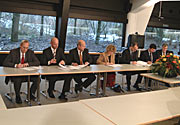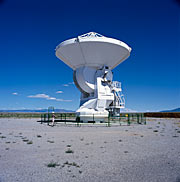Press Release
ESO Signs Largest-Ever European Industrial Contract For Ground-Based Astronomy Project ALMA
7 December 2005
ESO, the European Organisation for Astronomical Research in the Southern Hemisphere, announced today that it has signed a contract with the consortium led by Alcatel Alenia Space and composed also of European Industrial Engineering (Italy) and MT Aerospace (Germany), to supply 25 antennas for the Atacama Large Millimeter Array (ALMA) project, along with an option for another seven antennas. The contract, worth 147 million euros, covers the design, manufacture, transport and on-site integration of the antennas. It is the largest contract ever signed in ground-based astronomy in Europe.
The ALMA antennas present difficult technical challenges, since the antenna surface accuracy must be within 25 microns, the pointing accuracy within 0.6 arc seconds, and the antennas must be able to be moved between various stations on the ALMA site. This is especially remarkable since the antennas will be located outdoor in all weather conditions, without any protection. Moreover, the ALMA antennas can be pointed directly at the Sun. ALMA will have a collecting area of more than 5,600 square meters, allowing for unprecedented measurements of extremely faint objects.
The signing ceremony took place on December 6, 2005 at ESO Headquarters in Garching, Germany. "This contract represents a major milestone. It allows us to move forward, together with our American and Japanese colleagues, in this very ambitious and unique project," said ESO's Director General, Dr. Catherine Cesarsky. "By building ALMA, we are giving European astronomers access to the world's leading submillimetre facility at the beginning of the next decade, thereby fulfilling Europe's desire to play a major role in this field of fundamental research."
Pascale Sourisse, Chairman and CEO of Alcatel Alenia Space, said: "We would like to thank ESO for trusting us to take on this new challenge. We are bringing to the table not only our recognized expertise in antenna development, but also our long-standing experience in coordinating consortiums in charge of complex, high-performance ground systems."
ALMA is an international astronomy facility. It is a partnership between Europe, North America and Japan, in cooperation with the Republic of Chile. The European contribution is funded by ESO and Spain, with the construction and operations being managed by ESO. A matching contribution is being made by the USA and Canada, who will also provide 25 antennas. Japan will provide additional antennas, thus making this a truly worldwide endeavour.
ALMA will be located on the 5,000m high Llano de Chajnantor site in the Atacama Desert of Northern Chile. ALMA will consist of a giant array of 12-m antennas separated by baselines of up to 18 km and is expected to start partial operation by 2010-2011.
The excellent site, the most sensitive receivers developed so far, and the large number of antennas will allow ALMA to have a sensitivity that is many times better than any other comparable instrument.
"ALMA will bring to sub-millimetre astronomy the aperture synthesis techniques of radio astronomy, enabling precision imaging to be done on sub-arcsecond angular scales, and will nicely complement the ESO VLT/VLTI observatory", said Dr. Hans Rykaczewski, the ALMA European Project Manager.
Millimetre-wave astronomy is the study of the universe in the spectral region between what is traditionally considered radio waves and infrared radiation. In this realm, ALMA will study the evolution of galaxies, including very early stages, gather crucial data on the formation of stars, proto-planetary discs, and planets, and provide new insights on the familiar objects of our own solar system.
A prototype antenna had already been built by Alcatel Alenia Space and European Industrial Engineering and thoroughly tested along with prototypes antennas from Vertex/LSI and Mitsubishi at the ALMA Antenna Test Facility located at the Very Large Array site in Socorro, New Mexico.
For more information on the ALMA project, please go to http://www.eso.org/projects/alma/.
About the Release
| Release No.: | eso0540 |
| Legacy ID: | PR 31/05 |
| Name: | Atacama Large Millimeter/submillimeter Array, ESO Director General, Meeting |
| Type: | Unspecified : People : Other/General |
| Facility: | Other |
Our use of Cookies
We use cookies that are essential for accessing our websites and using our services. We also use cookies to analyse, measure and improve our websites’ performance, to enable content sharing via social media and to display media content hosted on third-party platforms.
ESO Cookies Policy
The European Organisation for Astronomical Research in the Southern Hemisphere (ESO) is the pre-eminent intergovernmental science and technology organisation in astronomy. It carries out an ambitious programme focused on the design, construction and operation of powerful ground-based observing facilities for astronomy.
This Cookies Policy is intended to provide clarity by outlining the cookies used on the ESO public websites, their functions, the options you have for controlling them, and the ways you can contact us for additional details.
What are cookies?
Cookies are small pieces of data stored on your device by websites you visit. They serve various purposes, such as remembering login credentials and preferences and enhance your browsing experience.
Categories of cookies we use
Essential cookies (always active): These cookies are strictly necessary for the proper functioning of our website. Without these cookies, the website cannot operate correctly, and certain services, such as logging in or accessing secure areas, may not be available; because they are essential for the website’s operation, they cannot be disabled.
Functional Cookies: These cookies enhance your browsing experience by enabling additional features and personalization, such as remembering your preferences and settings. While not strictly necessary for the website to function, they improve usability and convenience; these cookies are only placed if you provide your consent.
Analytics cookies: These cookies collect information about how visitors interact with our website, such as which pages are visited most often and how users navigate the site. This data helps us improve website performance, optimize content, and enhance the user experience; these cookies are only placed if you provide your consent. We use the following analytics cookies.
Matomo Cookies:
This website uses Matomo (formerly Piwik), an open source software which enables the statistical analysis of website visits. Matomo uses cookies (text files) which are saved on your computer and which allow us to analyze how you use our website. The website user information generated by the cookies will only be saved on the servers of our IT Department. We use this information to analyze www.eso.org visits and to prepare reports on website activities. These data will not be disclosed to third parties.
On behalf of ESO, Matomo will use this information for the purpose of evaluating your use of the website, compiling reports on website activity and providing other services relating to website activity and internet usage.
Matomo cookies settings:
Additional Third-party cookies on ESO websites: some of our pages display content from external providers, e.g. YouTube.
Such third-party services are outside of ESO control and may, at any time, change their terms of service, use of cookies, etc.
YouTube: Some videos on the ESO website are embedded from ESO’s official YouTube channel. We have enabled YouTube’s privacy-enhanced mode, meaning that no cookies are set unless the user actively clicks on the video to play it. Additionally, in this mode, YouTube does not store any personally identifiable cookie data for embedded video playbacks. For more details, please refer to YouTube’s embedding videos information page.
Cookies can also be classified based on the following elements.
Regarding the domain, there are:
- First-party cookies, set by the website you are currently visiting. They are stored by the same domain that you are browsing and are used to enhance your experience on that site;
- Third-party cookies, set by a domain other than the one you are currently visiting.
As for their duration, cookies can be:
- Browser-session cookies, which are deleted when the user closes the browser;
- Stored cookies, which stay on the user's device for a predetermined period of time.
How to manage cookies
Cookie settings: You can modify your cookie choices for the ESO webpages at any time by clicking on the link Cookie settings at the bottom of any page.
In your browser: If you wish to delete cookies or instruct your browser to delete or block cookies by default, please visit the help pages of your browser:
Please be aware that if you delete or decline cookies, certain functionalities of our website may be not be available and your browsing experience may be affected.
You can set most browsers to prevent any cookies being placed on your device, but you may then have to manually adjust some preferences every time you visit a site/page. And some services and functionalities may not work properly at all (e.g. profile logging-in, shop check out).
Updates to the ESO Cookies Policy
The ESO Cookies Policy may be subject to future updates, which will be made available on this page.
Additional information
For any queries related to cookies, please contact: pdprATesoDOTorg.
As ESO public webpages are managed by our Department of Communication, your questions will be dealt with the support of the said Department.



